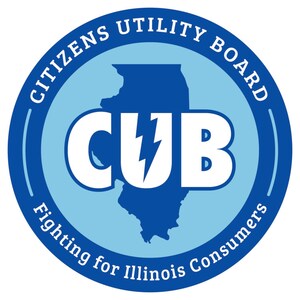CUB, EDF Push For Comprehensive Smart Grid Metric On Greenhouse Gas Emissions
CHICAGO, Sept. 12, 2014 /PRNewswire-USNewswire/ -- The Citizens Utility Board (CUB) and Environmental Defense Fund (EDF) have filed a petition asking state regulators to strengthen a metric that requires Illinois' two biggest electric utilities to show how historic upgrades to the power grid are reducing "greenhouse gas" emissions.
The filing makes Illinois a leader in the national discussion on how to address carbon emissions from power plants—an issue that's making headlines now that the Environmental Protection Agency has proposed cutting such emissions by about 30 percent by 2030.
The greenhouse gas petition, filed by CUB and EDF Wednesday, is related to major power-grid upgrades, collectively called the "smart grid," that were approved by the Illinois General Assembly in 2011 and are now being launched by Commonwealth Edison and Ameren Illinois. The improvements, including new digital electric meters, have the potential to make Illinois' electricity system cleaner and less costly.
Consumer advocates have worked with electric utilities to develop several metrics to track how the improvements would benefit power customers. Those metrics include recording the number of customers enrolled in money-saving pricing programs made possible by the meters, the number of smart-grid related complaints to state regulators—and the reduction in greenhouse gas emissions.
CUB and EDF want to work further with ComEd and Ameren to develop a more comprehensive greenhouse gas metric. Until now, the companies have primarily focused on how the reduction in utility trucks on the road would cut emissions.
While CUB and EDF agree that's a start and there have been good early discussions with ComEd and Ameren, the groups want the companies to also measure how a smarter power grid can help reduce or shift electricity usage, and, thus, reduce greenhouse gas emissions caused by power plants.
The upgrades, which began last year, open the door for better energy efficiency and optional demand-response programs that shift electricity usage from "peak" times. (Those are hot summer days when electricity usage is high, power plants are working hardest, and electricity prices can skyrocket.)
"We believe strongly that it's not enough to simply track how these improvements reduce utility trucks on the road," CUB Executive Director David Kolata said. "The smart grid is much smarter than that. It has the potential to make the grid more efficient and cleaner. As the nation tackles the issue of carbon emissions we owe it to consumers to clearly track such benefits."
CUB and EDF hope the Illinois Commerce Commission (ICC) rules on the filing in time for ComEd and Ameren to incorporate it into their smart grid deployment plans when those plans go through their annual review in April 2015.
CUB, Illinois' leading nonprofit utility watchdog organization, is celebrating its 30th Anniversary. Created by the Illinois Legislature, CUB opened its doors in 1984 to represent the interests of residential and small-business utility customers. Since then, CUB has saved consumers more than $10 billion by helping to block rate hikes and secure refunds over the years. For more information, call CUB's Consumer Hotline at 1-800-669-5556 or visit CUB's award-winning website, www.CitizensUtilityBoard.org.
SOURCE Citizens Utility Board
WANT YOUR COMPANY'S NEWS FEATURED ON PRNEWSWIRE.COM?
Newsrooms &
Influencers
Digital Media
Outlets
Journalists
Opted In





Share this article